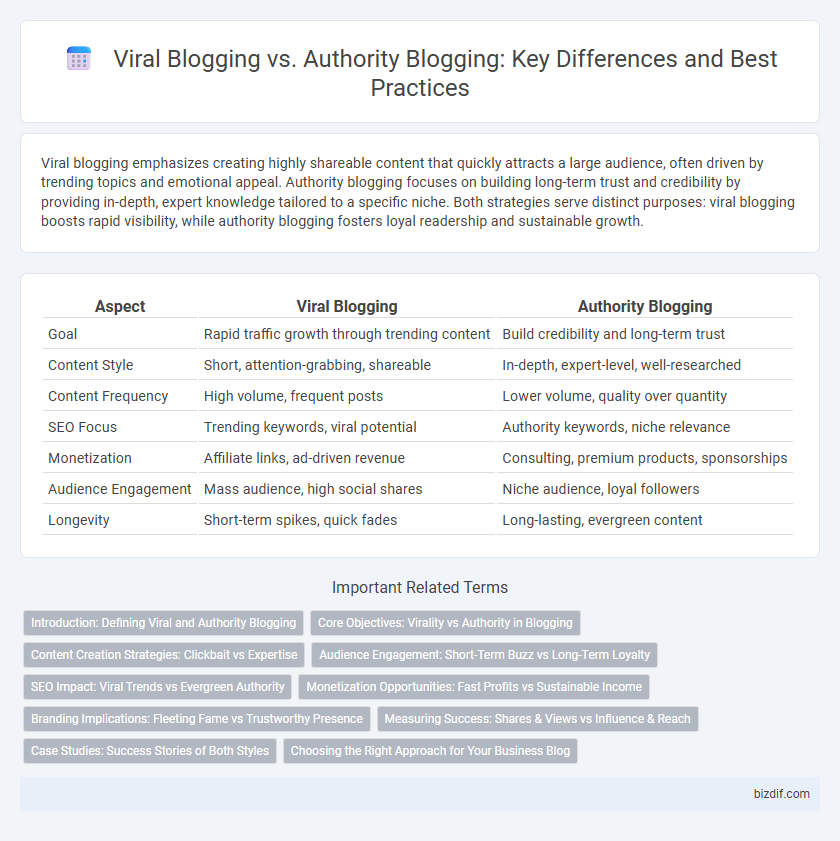Viral blogging emphasizes creating highly shareable content that quickly attracts a large audience, often driven by trending topics and emotional appeal. Authority blogging focuses on building long-term trust and credibility by providing in-depth, expert knowledge tailored to a specific niche. Both strategies serve distinct purposes: viral blogging boosts rapid visibility, while authority blogging fosters loyal readership and sustainable growth.
Table of Comparison
| Aspect | Viral Blogging | Authority Blogging |
|---|---|---|
| Goal | Rapid traffic growth through trending content | Build credibility and long-term trust |
| Content Style | Short, attention-grabbing, shareable | In-depth, expert-level, well-researched |
| Content Frequency | High volume, frequent posts | Lower volume, quality over quantity |
| SEO Focus | Trending keywords, viral potential | Authority keywords, niche relevance |
| Monetization | Affiliate links, ad-driven revenue | Consulting, premium products, sponsorships |
| Audience Engagement | Mass audience, high social shares | Niche audience, loyal followers |
| Longevity | Short-term spikes, quick fades | Long-lasting, evergreen content |
Introduction: Defining Viral and Authority Blogging
Viral blogging focuses on creating highly shareable content designed to generate rapid spikes in traffic and social media engagement, often leveraging trending topics and emotional appeal. Authority blogging centers on delivering in-depth, expert-driven content that builds trust and long-term credibility within a specific niche, attracting a loyal and steady audience. Understanding these distinct approaches is crucial for developing effective content strategies that either maximize short-term visibility or establish sustained influence.
Core Objectives: Virality vs Authority in Blogging
Viral blogging aims to generate rapid, widespread sharing of content to maximize immediate visibility and traffic, often leveraging trending topics and emotional appeal. Authority blogging focuses on building long-term credibility and trust by providing in-depth, expert insights that establish the blogger as a niche leader. The core objective for viral blogging is reach and engagement spikes, while authority blogging prioritizes sustained influence and audience loyalty.
Content Creation Strategies: Clickbait vs Expertise
Viral blogging relies on clickbait content strategies that prioritize sensational headlines and emotionally charged stories to rapidly attract high traffic and social shares. Authority blogging emphasizes expertise-driven content, focusing on in-depth analysis, credible sources, and niche-specific knowledge to build long-term trust and audience loyalty. Effective content creation for authority blogging involves comprehensive research and original insights, whereas viral blogging often capitalizes on trending topics and shareability.
Audience Engagement: Short-Term Buzz vs Long-Term Loyalty
Viral blogging generates rapid spikes in audience engagement through shareable, trending content that captures immediate interest but often lacks sustained interaction. Authority blogging builds long-term loyalty by consistently delivering in-depth, credible information that fosters trust and repeat visits from a dedicated readership. Balancing viral posts with authoritative content maximizes both short-term buzz and enduring audience relationships.
SEO Impact: Viral Trends vs Evergreen Authority
Viral blogging generates rapid spikes in traffic by targeting trending topics and leveraging social sharing, but its SEO impact is often short-lived due to fluctuating search interest and content relevancy. Authority blogging, focused on evergreen content, consistently improves search engine rankings through in-depth expertise, topical relevance, and sustained user engagement. Search algorithms favor authority blogs for long-term organic visibility, while viral blog posts may require frequent updates to maintain SEO value.
Monetization Opportunities: Fast Profits vs Sustainable Income
Viral blogging generates fast profits through rapid spikes in traffic and ad revenue but often lacks long-term stability and audience loyalty. Authority blogging builds sustainable income by cultivating trust, consistent readership, and multiple monetization streams like sponsored content, affiliate marketing, and online courses. Prioritizing authority blogging enhances long-term monetization opportunities and brand credibility over short-term viral gains.
Branding Implications: Fleeting Fame vs Trustworthy Presence
Viral blogging generates rapid spikes in traffic but often results in fleeting fame with minimal brand loyalty, as audiences may quickly move on to the next trend. Authority blogging builds a trustworthy presence by consistently providing valuable, expert content, fostering long-term relationships and credibility within a niche. Brands focused on sustainable growth benefit more from authority blogging, which strengthens reputation and drives sustained engagement.
Measuring Success: Shares & Views vs Influence & Reach
Measuring success in viral blogging primarily relies on high numbers of shares and views, reflecting immediate popularity and widespread attention. Authority blogging emphasizes influence and reach by building a trusted reputation and long-term audience engagement within a niche. These metrics highlight contrasting goals: viral blogging prioritizes quick exposure, while authority blogging focuses on sustained credibility and impact.
Case Studies: Success Stories of Both Styles
Case studies reveal that viral blogging, exemplified by BuzzFeed's rapid audience growth through shareable content, generates quick spikes in traffic and engagement by targeting trending topics. Authority blogging, demonstrated by Neil Patel's comprehensive SEO guides, builds long-term credibility and sustained organic growth by delivering in-depth expertise and consistent value. Both approaches have distinct success metrics, with viral blogging excelling in short-term visibility and authority blogging dominating in search engine rankings and loyal readership.
Choosing the Right Approach for Your Business Blog
Viral blogging generates rapid traffic spikes through shareable, trendy content while authority blogging builds long-term credibility with in-depth, expert insights. Businesses targeting quick brand awareness and audience engagement benefit from viral blogging, whereas those aiming for sustained trust and higher search rankings should prioritize authority blogging. Selecting the right approach depends on your goals for audience growth, content strategy, and desired impact on business reputation.
Viral Blogging vs Authority Blogging Infographic

 bizdif.com
bizdif.com